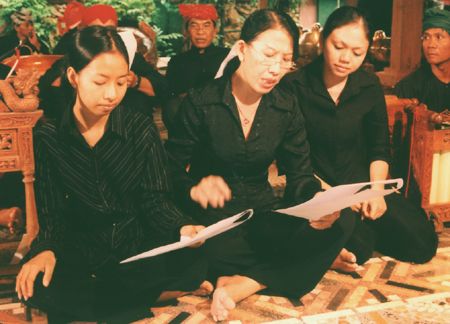Gamelan Concert
Garasi Seni Benawa Ensemble
Surakarta/Central Java

In Surakarta, a former Mataram court city, an independent and open-minded music scene has established itself as an important part of the city’s cultural life. Rahayu Supanggah conducts the Garasi Seni Benawa ensemble and is one of the most prominent artists in Indonesia—his compositions are often in demand for international productions, most recently one with Robert Wilson. One of the compositions to be performed in Berlin, entitled “Bulan”, was written by the German-educated composer Suka Hardjana, who brilliantly takes on the topic of tradition vs. modernity. The third composer, Darno, brings a facet of his local culture to the performance with original bamboo instruments.
The Evening’s Compositions
Timasan Bedaya Temanten (trad. + Rayahu Supanggah , 2005)
“Bedaya” is an abstract form of dance drama and an important element in all Javanese court ceremonies. The various forms of “bedaya” are based on stories of love and war . Each “bedaya” is normally performed by nine young girls, all wearing similar costumes and carrying out similar movements. Moreover, the text is always sung, for only in this way can the underlying story be fully understood by the viewer. The music plays an important role, as can be seen in the fact that each “bedaya” bears the name of its main melody. A typical characteristic of this music is choral singing. In this context, the voice is viewed as a musical instrument, enjoying a status entirely equal to that of the instruments rather than simply being “accompanied” by them.
Evolusi-Bambu ( Darno , 2005)
This composition was influenced by various types of bamboo sounds from the everyday life of the rural population in the area surrounding Banyumas. There, bamboo serves not only as a tool for tilling the fields, but also as a weapon for hunting birds and as a musical instrument. In this context it is the tension between sounds produced consciously, and random sound produced through work, that is particularly interesting. For example, farmers attempting to scare off birds from the rice fields often end up creating music through coordinated rhythms.
The musical use of bamboo has evolved over time; in the area around Banyumas, numerous ensembles using bamboo instruments have been founded. With this in mind, Darno has written this piece for bamboo instruments - a work that also portrays the cycle of human life.
Anane Ana ( Rahayu Supanggah , 2005)
“Nang, ning, nung, nang“ is seen by some Javanese as a sign for the beginning of life. A newborn first learns music (the voice), then dance (movement), and later the fine arts. Furthermore, “Nang, ning, nung, nang” is used to describe the fundamental element of Javanese music. With his composition Anane ana, Rahayu Supanggah takes the basic sound of music and Javanese conception of the beginning of life as his theme: “Life is a game; it is also mutual giving and taking. One should also be able to laugh about oneself - why not!”
Bulan ( Suka Hardjana , 1995/2005)
This monumental work can be described as a new beginning in Suka Hardjana’s career as a composer. It was originally conceived as the soundtrack to the film Bulan Tertusuk Ilalang by Garin Nugroho. For some reason that remains unclear even to this day, the music was composed before the script was written, and thus it is no surprise that a collaboration afterwards was nearly impossible. Consequently, Suka Hardjana prepared the piece as an autonomous work, as it is performed here.Bulan is a suite-like composition that continues the idiom of traditional Javanese music in a very subtle fashion, reinterpreting it and thus, in the end, leading to a new form. In this way, different aesthetic levels, as well as different temporal levels represented by various styles, are able to coexist and, from a Javanese point of view, create a sort of circular temporality. Suka Hardjana’s familiarity with the European avant-garde and his feeling for its aesthetic premises are apparent, yet at no point does one gain the impression that the piece is a simple imitation. Indeed, it is precisely the subtle transformations in this work that distinguish it as a milestone in the development of modern gamelan music.
Programme
Rahayu Supanggah: Timasan Bedaya Temanten (2005)
Darno: Evolusi Bambu (2005)
Rahayu Supanggah: Anane Ana
INTERVAL
Suka Hardjana: Bulan (1995/2005)
Director of the ensemble: Rustiantoro, Rahayu Supanggah
Composers: Rahayu Supanggah, Darno
Guest composer: Suka Hardjana, Jakarta
Withinin the framework of the Asia-Pacific Weeks, which are supported by the Stiftung Deutsche Klassenlotterie Berlin (DKLB).